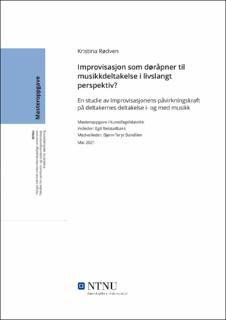| dc.contributor.advisor | Reistadbakk, Egil | |
| dc.contributor.advisor | Bandlien, Bjørn-Terje | |
| dc.contributor.author | Rødven, Kristina | |
| dc.date.accessioned | 2021-09-28T17:52:39Z | |
| dc.date.available | 2021-09-28T17:52:39Z | |
| dc.date.issued | 2021 | |
| dc.identifier | no.ntnu:inspera:76520369:15443528 | |
| dc.identifier.uri | https://hdl.handle.net/11250/2785145 | |
| dc.description.abstract | Denne studien undersøker hvordan en improvisatorisk tilnærming til musikkundervisning påvirker deltakelse i- og med musikk. Deltakelse inkluderer tro på å kunne delta, at elevene selv mener de deltar og deres forståelse av musikk. Hensikten med denne forskningen er å undersøke om improvisasjon kan fungere som en tilnærming som kan gi grunnlag til deltakelse i musikk i et livslangt perspektiv. Dette belyses gjennom problemstillingen: Hvordan kan en improvisatorisk tilnærming til musikkundervisning i prosjektet påvirke deltakernes deltakelse i- og med musikk?, som igjen operasjonaliseres gjennom tre forskningsspørsmål: 1) Hvordan kan en forskerlærer utvikle undervisning i- og med improvisasjon for å fremme deltakelse? 2) Hvordan påvirker undervisning i- og med improvisasjon lærers deltakelse i- og med musikk?3) Hvordan påvirker undervisning i- og med improvisasjon elevenes deltakelse i- og med musikk?
Studien er epistemologisk plassert innen sosial konstruksjonisme, der kritisk teori med fokus på kritisk pedagogikk utgjør det vitenskapsteoretiske ståstedet. Metodologisk plasseres studien i aksjonsforskning med autoetnografisk blikk i analysen, der datainnsamlingsmetoder som observasjonslogg, audioopptak, refleksjonslogger fra lærer og elever er blitt tatt i bruk. Deltakerne i studien inkluderer elever og forskerlærer, der forskerlærer har gjennomført deltakende observasjon og undervisning. Datamaterialet har både blitt analysert underveis- og i etterkant av prosjektet. Problemstillingen undersøkes i lys av tre hovedteorier: improvisasjon, musikalitet, musicking. Improvisasjon benyttes som tilnærming i undervisningen for å åpne opp for lærer og elevers samspill og utforskning. Musikalitet bidrar med et perspektiv som kan belyse sammenhengen mellom deltakelse og musikk- og musikalitetsforståelse. På grunn av studiens deltakende og kritiske karakter, er musicking (Small, 1998a) vektlagt som begrep for å åpne for musikkens sosiale karakter og trekke fokuset bort fra verks- og fremføringsbasert forståelse av musikk.
Funnene i mitt datamateriale gir indikasjoner til at en improvisatorisk tilnærming til musikkundervisning i prosjektet har påvirket deltakernes deltakelse i- og med musikk. Her trekkes det frem at det har skjedd endringer i flere elevers tro på at de kan delta i å lage/skape musikk, at de selv mener de deltar i å lage/skape musikk og i elevenes forståelse av musikk. Når det gjelder påvirkning på læreres deltakelse i- og med musikk, kommer aspekter som endring i lærerrollen, endring i min rolle i musikkskapingen/improvisasjonen/musickingen, endring i synet på elever og endring i min forståelse av hvordan man kan jobbe med musikk. | |
| dc.description.abstract | This study examines how an improvisational approach to music education affects participation in- and with music. When referring to participation, I am referring to the belief in one’s ability to participate, the students’ expressed meaning of participation and the students’ understanding of music. The purpose of this research is to investigate whether improvisation can function as a teaching approach that can provide a lifelong basis for participation in music. This is examined through the main research question: How can an improvisational approach to music education in the project affect the participants' participation in and with music?, which is operationalized through three research questions: 1) how can a researching teacher develop lessons in and with improvisation to promote participation? 2) How do lessons in and with improvisation affect the teacher’s participation in and with music? 3) How do lessons in and with improvisation affect student’s participation in- and with music? The study is epistemologically placed within social constructionism, where critical theory with a focus on critical pedagogy is the theoretical framework of this study. Methodologically, the study is placed in action research and includes analysis that has an autoethnographic perspective, where the data collection methods such as observation logs, audio recordings, reflection logs from the teacher and students have been used. The research questions are examined through the use of three main theories: improvisation, musicality, musicking. Improvisation is used as an approach in teaching to open up for teacher and student interaction and exploration. Musicality contributes with a perspective that can shed light on the connection between participation and music/musical understanding. Due to the participatory and critical nature of the study, musicking (Small, 1998a) is emphasized as a concept to focus on the social aspect of music and draw the focus away from product and the performance-based understanding of music. The findings in this study give indications that an improvisational approach to music education in this project has influenced the participants’ participation in and with music. There have been changes in several students’ beliefs that they can participate in making/creating music, a change in the students’ expressed meaning about their participation in making/creating music, and a change in the students' understanding of music. When it comes to influencing the teachers' participation in- and with music, there has been a change in the teacher’s role, a change in my role in music creation/ improvisation/ musicking, a change in the view of students and a change in my understanding of how to work with music. | |
| dc.language | nob | |
| dc.publisher | NTNU | |
| dc.title | Improvisasjon som døråpner til musikkdeltakelse i livslangt perspektiv?
En studie av improvisasjonens påvirkningskraft på deltakernes deltakelse i- og med musikk | |
| dc.type | Master thesis | |
